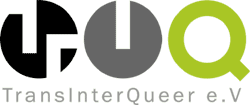
There is a very special place in Berlin-Kreuzberg - on a former factory floor - where the premises of TransInterQueer. The association is a point of contact for people who do not want to categorise themselves as male or female. Werner Bock spoke to Arn Sauer, who is a volunteer with TransInterQueer.
Editor's note: The underscore is used in this text, e.g. for activists. This indicates that there is more than just the female and male form. The underscore is a placeholder for everything in between or beyond. Trans* is a shortened spelling that stands for various nouns or adjectives such as transgender, trans woman, trans man, transidentical or transsexual.
The fact that there are gays, lesbians and bisexuals has now spread to the furthest corners of the republic. However, many people wonder what is behind terms such as transsexual or intersexual. Can you enlighten us?
Many people think that "trans*" means being born in the wrong body. This is often the case, but not in all cases. Sometimes it is also about not being able to do anything with the two gender roles of "man" and "woman". So "trans*" is not primarily about physical appearance, but above all about how you feel about your gender. Trans* people cannot or cannot clearly categorise themselves as the gender they were assigned at birth. Whether they feel "right" in the opposite gender, between the genders or preferably without gender categorisation varies from person to person.
And what does the term intersexual mean?
Intersex people are people who cannot be clearly categorised as male or female at birth. Incidentally, intersex activists prefer terms such as intersex or intergender because they are not medically pathologising. When a child is born as intersex, many parents are initially shocked. You know how it is, the first question is always: girl or boy? Intersex or hermaphrodites are not recognised in society. When such a child is born, the testing machinery starts: hormone status, chromosomes, reproductive organs and much more. Parents are under great social pressure and doctors advise gender reassignment surgery - often without any health reason. We have a completely different opinion on this: we believe that one should wait with such irreversible interventions until the child can decide for themselves later on. This is because gender reassignment surgery at an incapacitated age violates the human right to physical integrity and self-determination.
You work in Berlin at the TransInterQueer e.V. organisation - what is your concern?
Our main aim is to create a political and social space that allows for gender diversity. In our local spaces, people can meet and exchange ideas who do not or do not want to conform to the conventional male/female scheme - either physically or in terms of their feelings and self-image. It is also a space where they can try things out, where their gender identity does not need to be explained or made dependent on outward appearances. We have services such as our hermaphrodite café, our "neither/nor" group and, of course, a counselling service.
What issues do people turn to you for advice?
This is completely different. The topic is often the procedure for gender reassignment. There are many health issues and questions about the risks. Legal issues also play a role, for example: How do I get a name and civil status change? As an intersex person, how can I access my hospital files? What do I do if I am discriminated against, harassed or bullied at work? And, of course, coming out issues and the associated problems in the family, with friends or at work also play a role.
What political demands does your organisation make?
We oppose the pathologisation of trans* and inter* identities, i.e. defining them as pathological. Transgender people are neither sick nor exotic. It is simply a human right that trans* and inter* people can live the way they want to. We are campaigning for more acceptance and a greater diversity of lifestyles in our society. That is why we are committed to dismantling prejudice and discrimination in relation to bodies, gender identity, gender expression and sexual orientation.
Your organisation was founded in 2006. What has changed in the six years?
Little has changed in everyday life. There is still a lack of understanding and therefore, for example, problems at work or verbal abuse on the street. Unfortunately, the medical methods for gender reassignment are not yet fully developed. On the other hand, a trans community has developed and the first tentative beginnings of an intersex movement have emerged. Many people are no longer afraid to openly describe themselves as trans* - and not just in Berlin. As a result, transgender is also becoming more visible. The lesbian and gay scene has become more open and media reporting on trans and intersexuality has become more differentiated. That is at least a start.
If you could wish for something, what would be your message to society - or a little less pathetic - to each and every one of us?
We don't want to take away anyone's masculinity or femininity. If that's right for the person in question - great, lucky you. We are more interested in creating an awareness of diversity. There are more than just men and women. We want to dismantle these stereotypes and the negative consequences of standardising gender roles - at a legal level and in everyday life.









